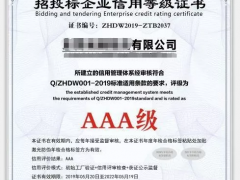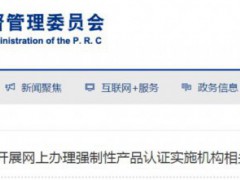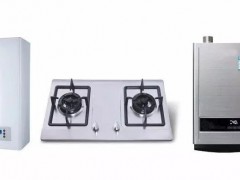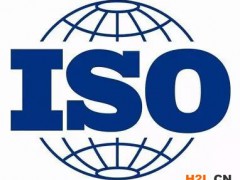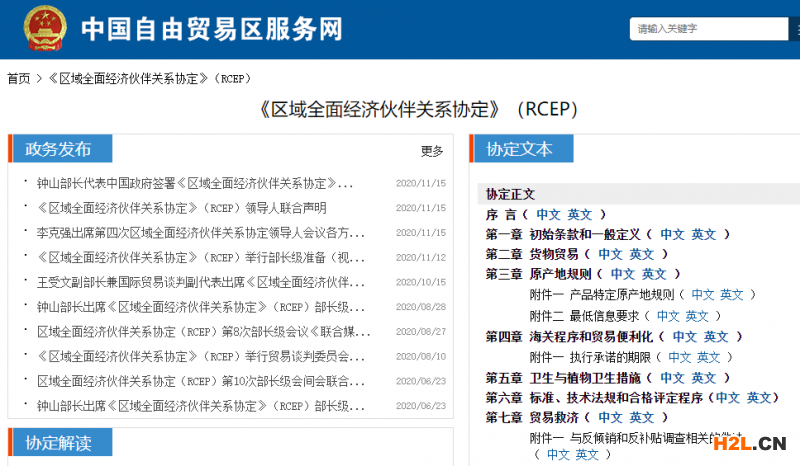
11月15日,東盟10國和中國、日本、韓國、澳大利亞、新西蘭等15國領導人達成協議,正式簽署區域全面經濟伙伴關系協定(RCEP)。日前,中國自由貿易區服務網發布了RCEP文本。協定文本共20章,其中第六章為“標準、技術法規和合格評定程序”。第六章全文如下:
第六章 標準、技術法規和合格評定程序
第一條 定義
就本章而言,《技術性貿易壁壘協定》附件一中規定的術語及其定義應當適用。
第二條 目標
本章的目標是通過以下方式便利締約方之間的貨物貿易:
(一)保證標準、技術法規和合格評定程序不對貿易造成不必要的障礙;
(二)加強《技術性貿易壁壘協定》的實施;
(三)促進對每一締約方標準、技術法規和合格評定程序的相互諒解;
(四)加強締約方在標準、技術法規和合格評定程序領域包括在相關國際機構的工作中的信息交流與合作,。
(五)解決本章項下可能出現的問題;以及
(六)提供實現這些目標的框架。
第三條 范圍
一、本章應當適用于可能影響締約方之間貨物貿易的中央政府機構的標準、技術法規和合格評定程序。本章不得適用于:
(一)任何第五章(衛生與植物衛生措施)所涵蓋的任何衛生或植物衛生措施;以及
(二)政府機構為其生產或消費要求所制定的采購規格。
二、每一締約方應當采取其所能采取的合理措施,保證其領土內的負責標準、技術法規和合格評定程序的制定、采取和實施的地方政府機構和非政府機構在本章的執行過程中的合規性。
三、本章的任何規定不得阻止一締約方以與《技術性貿易壁壘協定》和本章相一致的方式,制定、采取、實施或維持標準、技術法規和合格評定程序。
第四條 《技術性貿易壁壘協定》的確認和并入
一、每一締約方確認其在《技術性貿易壁壘協定》項下的權利和義務,《技術性貿易壁壘協定》的下列條款經必要修改后并入本協定,成為本協定的一部分:
(一)第二條,除第四款、第七款、第八款和第十二款外;
(二)第四條第二款;
(三)第五條,除第四款外;
(四)第六條第三款;
(五)第九條第一款;以及
(六)附件三,除第一款外。
二、如根據第一款并入的《技術性貿易壁壘協定》的任何規定與本章的其他規定不一致,應當以后者為準。
三、任何締約方不得僅就指控違反并入本條第一款的《技術性貿易壁壘協定》條款的任何爭端,訴諸第十九章(爭端解決)項下的爭端解決。
第五條 國際標準、指南和建議
一、締約方認識到國際標準、指南和建議在協調技術法規、合格評定程序和國家標準,以及減少不必要的貿易壁壘方面可以發揮重要作用。
二、在決定《技術性貿易壁壘協定》第二條、第五條和附件三意義上的國際標準、指南或建議是否存在時,每一締約方考慮 WTO技術性貿易壁壘委員會(下稱“WTO TBT 委員會”)發布的《委員會關于制定與第二條、第五條和附件三有關的國際標準、指南和建議的原則的決定》(G/TBT/9,2000年 11 月 13 日,附件四)以及隨后與此相關的決定和建議中列出的原則。
三、締約方應當在適當的情況下,加強互相之間在例如WTO TBT 委員會等其他國際層面的活動中討論國際標準和相關問題時的協調和溝通。
第六條 標準
一、對于標準的制定、采取和實施,每一締約方應當保證其制定、采取和實施國家標準的一個或多個標準化機構接受并遵守《技術性貿易壁壘協定》附件三的規定。
二、如制定一締約方的國家標準需要對相關國際標準內容或結構進行修改,應另一締約方請求,該締約方應當鼓勵其標準化機構提供標準內容和結構方面的差異,以及差異的原因。除實際遞送費用外,此項服務的任何收費對國內外各人員應當相同。
三、除第二款外,每一締約方應當保證其一個或多個標準化機構保證不制定、不采用或不實施在目的或效果上對國際貿易造成不必要障礙的,對國際標準內容和結構的修改。
四、每一締約方應當鼓勵其領土內相關的一個或多個標準化機構與其他締約方的一個或多個標準化機構之間在如下領域進行合作:
(一)交換標準的信息;
(二)交換與標準制定程序相關的信息;以及
(三)在有共同利益的領域進行國際標準化活動。
第七條 技術法規
一、每一締約方應當在《技術性貿易壁壘協定》第二條第四款的范圍內,使用相關國際標準或其中相關的部分,作為其技術法規的基礎。如一締約方未將此類國際標準或其相關的部分作為其技術法規的基礎,應另一締約方請求,該締約方應當解釋其原因。
二、在實施《技術性貿易壁壘協定》第二條第二款時,每一締約方應當考慮可供選擇的替代方案,以保證擬議采取的技術法規對貿易的限制不超過為實現合法目標所必需的限度。
三、即使其他締約方的技術法規不同于自己的法規,每一締約方應當積極考慮將其他締約方的技術法規作為等效法規加以接受,只要該締約方確信這些法規足以實現與其法規相同的目標。
四、如果一締約方不能接受另一締約方的技術法規作為其自己的等效法規,應另一締約方請求,該締約方應當解釋其作出決定的原因。
五、在實施《技術性貿易壁壘協定》第二條第八款時,如一締約方不是按照產品的性能而是按照其設計或描述特征來制定技術法規,應另一締約方請求,該締約方應當解釋其原因。
六、除發生安全、健康、環境保護或者國家安全的緊急問題或面臨發生此類問題的威脅外,締約方應當允許在技術法規的公布和生效之間留出合理時間間隔,以為出口締約方的生產商提供充足的時間使其產品和生產方法適應進口締約方的要求。就本款而言,“合理時間間隔”通常應當被理解為不少于六個月的期限,除非該期限導致無法實現技術法規所追求的合法目標。
七、應有興趣制定與另一締約方技術法規相似的技術法規的一締約方的請求,被請求締約方應當在可行的范圍內提供相關信息,包括其在制定過程中所依據的研究或文件,機密信息除外。
八、每一締約方應當將其中央政府機構制定和采取的技術法規無差別且一致地適用于其全部領土。為進一步明確,本款不得被解釋為阻止地方政府機構以與《技術性貿易壁壘協定》相一致的方式,制定、采取和實施額外的技術法規。
第八條 合格評定程序
一、除《技術性貿易壁壘協定》第五條第四款規定外,每一締約方應當保證中央政府機構使用相關國際標準或其相關的部分,作為其合格評定程序的基礎,除非應請求作出適當說明,指出此類國際標準或其相關的部分由于下列原因尤其不適用于相關締約方:國家安全要求;防止欺詐行為;保護人類、動物或植物的生命或健康,或保護環境;基本氣候因素或其他地理因素;基本技術問題或基礎設施問題。
二、為提高效率,避免重復,以及保證合格評定的成本效益,每一締約方認識到接受另一締約方作出的合格評定程序結果的重要性。
三、每一締約方應當盡可能保證接受另一締約方的合格評定程序結果,即使另一締約方的合格評定程序與自己的程序不同,除非這些程序不能確保符合與自己程序等效的技術法規或標準。
四、應另一締約方請求,一締約方應當解釋不接受該另一締約方合格評定程序結果的原因。
五、每一締約方認識到,根據該締約方的情況以及所涉及的具體部門,存在一系列廣泛的機制以便利接受另一締約方實施的合格評定程序結果。此類機制可以包括:
(一)對有關締約方各機構作出的合格評定程序結果的互認協定;
(二)締約方認可機構之間或有關締約方合格評定機構之間的(自愿)合作安排;
(三)對合格評定機構進行認可,包括通過相關多邊協定或安排,認定合格評定機構具備資質,以承認其他締約方所給予的認可;
(四)指定另一締約方的合格評定機構;
(五)一締約方單方承認另一締約方作出的合格評定程序結果;以及
(六)制造商或供應商的自我合格聲明。
六、應合理請求,有關締約方應當就第五款所提及的機制,包括其制定和實施,進行信息交流或經驗共享,以便利接受合格評定程序結果。
七、締約方認識到包括區域性組織在內的相關國際組織,在合格評定領域的合作中可以發揮的重要作用。在這方面,每一締約方在便利這項合作時,應當考慮該締約方相關機構在此類組織中的參與狀況或成員資格。
八、締約方同意鼓勵相關合格評定機構開展更密切的合作,以便利締約方接受合格評定結果。
九、每一締約方應當在可能的范圍內,在不低于給予該締約方合格評定機構的條件下,允許另一締約方的合格評定機構參與其合格評定程序。
十、如果一締約方允許其合格評定機構參與而不允許另一締約方的合格評定機構參與其合格評定程序,應該另一締約方的請求,該締約方應當解釋其拒絕的原因。
第九條 合作
一、締約方應當在與本章目標相一致地基礎上,加強在標準、技術法規和合格評定程序領域的合作。
二、應另一締約方請求,一締約方應當積極考慮就與標準、技術法規和合格評定程序相關的共同利益事項提出的合作建議。
三、此類合作應當基于共同確定的條款和條件,可以包括:
(一)與標準、技術法規和合格評定程序的制定和實施相關的建議、技術援助或能力建設;
(二)締約方政府和非政府合格評定機構之間就共同利益事項的合作;
(三)在有關區域和國際組織制定和實施標準和合格評定程序的工作中,就共同感興趣的領域開展合作,如增強參與有關區域和國際組織制定的相互承認框架;
(四)增強在制定和改善標準、技術法規和合格評定程序方面的合作;以及(五)加強在 WTO TBT 委員會和其他相關國際或地區層面活動中的溝通與協調。
四、應另一締約方請求,每一締約方應當考慮部門具體建議,以進行本章項下有共同利益的合作。
第十條 技術討論
一、如一締約方認為有需要解決與貿易和本章項下的條款相關的問題,其可以作出書面請求進行技術討論。被請求締約方應當盡快對該請求作出答復。
二、除有關締約方另行約定外,被請求締約方應當在 60天內與請求締約方進行技術討論以達成共同滿意的解決辦案。技術討論可以通過有關締約方同意的任何方式作出。
第十一條 透明度
一、締約方認識到《技術性貿易壁壘協定》中有關透明度規定的重要性。在這方面,締約方應當考慮由 WTO TBT委員會發布的《WTO 技術性貿易壁壘委員會自 1995 年 1 月 1 日以來通過的決定和建議》(G/TBT/1/Rev.13)中相關的決定和建議,以及其可能的修訂。
二、應書面請求,如已有通報的技術法規和合格評定程序的英文全文或摘要,一締約方應當向提出請求的締約方提供。如沒有通報的技術法規和合格評定程序的英文全文或摘要,該締約方應當在有關締約方同意的合理期限內,在可能的情況下,在收到書面請求后 30 天內,以英文向請求締約方提供一份摘要,說明所通報的技術法規和合格評定程序的要求。在實施前句要求時,摘要的內容應當由被請求締約方確定。
三、應另一締約方請求,每一締約方應當提供與被請求締約方已經實施或擬實施的技術法規或合格評定程序的目標和理由相關的信息。
四、除發生安全、健康、環境保護或者國家安全的緊急問題或面臨發生此類問題的威脅外,每一締約方通常應當依照《技術性貿易壁壘協定》第二條第九款和第五條第六款向6-8WTO 通報之日起 60 天內,允許其他締約方提供書面意見。每一締約方應當考慮另一締約方的意見,并且應當應請求努力提供對這些意見的答復。
五、每一締約方應當允許另一締約方的相關人員,在遵循其法律和法規的情況下,按照不低于其給予本國人的條件,參與締約方為制定技術法規、國家標準和合格評定程序而向公眾提供的磋商程序。
六、如一締約方因技術法規或合格評定程序不符合要求而在入境點扣留進口貨物時,其應當盡快將扣留的原因通報進口商或其代表。
七、除本章另有規定外,一締約方根據本章請求提供的任何信息或解釋,應當由被請求締約方在有關締約方同意的合理期限內以書面或電子形式提供,并且在可能的情況下,在 60 天內提供。應請求,被請求締約方應當以有關締約方同意的一種或多種語言提供此類信息或解釋,或者在可能的情況下以英文提供。
第十二條 聯絡點
一、每一締約方應當在本協定對該締約方生效之日起 30天內指定一個或多個聯絡點負責協調本章的實施,并且將該聯絡點中相關官員的聯系方式通報其他締約方,包括電話號碼、傳真號碼、電子郵件地址,以及任何其他相關詳細信息。每一締約方應當將此類聯系方式的任何變更及時通報其他締約方。
二、每一締約方應當保證其一個或多個聯絡點便利締約方之間就標準、技術法規和合格評定程序交換信息,以答復另一締約方對此類信息的所有合理請求。
第十三條 實施安排
締約方可以制定雙邊或多邊安排,列出為實施本章共同感興趣的合作領域。鼓勵在本章項下通過此類安排的締約方在共同同意的情況下,向貨物委員會報告此類安排。
第十四條 爭端解決
第十九章(爭端解決)不適用于本協定生效時在本章項下產生的任何事項,締約方應當在本協定生效之日起的兩年內對該不適用進行審查。在審查過程中,締約方應當積極考慮將第十九章(爭端解決)的規定適用于本章的全部或部分內容。此類審查應當在本協定生效之日起的三年內完成。
英文版本
6-1CHAPTER
6STANDARDS, TECHNICAL REGULATIONS, AND ConFORMITY ASSESSMENT PROCEDURES
Article 6.1: Definitions
For the purposes of this Chapter, the terms and their definitions provided in Annex 1 of the TBT Agreement shall apply.
Article 6.2: Objectives
The objectives of this Chapter are to facilitate trade in goods among the Parties by:
(a) ensuring that standards, technical regulations, and conformity assessment procedures do not create unnecessary obstacles to trade;
(b) enhancing the implementation of the TBT Agreement;
(c) promoting mutual understanding of each Party’s standards, technical regulations, and conformity assessment procedures;
(d) strengthening information exchange and cooperation among the Parties in the field of standards, technical regulations, and conformity assessment procedures including in the work of relevant international bodies;
(e) addressing the issues that may arise under this Chapter;and
(f) providing a framework to realise these objectives.
Article 6.3: Scope
1. This Chapter shall apply to the standards, technical regulations,and conformity assessment procedures of central government bodies that may affect trade in goods among the Parties. ThisChapter shall not apply to:
(a) any sanitary or phytosanitary measure, which is covered by Chapter 5 (Sanitary and Phytosanitary Measures); and
(b) purchasing specifications prepared by governmental bodies for production or consumption requirements of governmental bodies.
2. Each Party shall take such reasonable measures as may be available to it to ensure compliance, in the implementation of this Chapter, by local government bodies and non-governmental bodies within its territory which are responsible for the preparation, adoption, and application of standards, technical regulations, and conformity assessment procedures.
3. Nothing in this Chapter shall prevent a Party from preparing, adopting, applying, or maintaining standards, technical regulations, and conformity assessment procedures in a manner consistent with the TBT Agreement and this Chapter.
Article 6.4: Affirmation and Incorporation of the TBT Agreement
1. Each Party affirms its rights and obligations under the TBT Agreement and the following provisions of the TBT Agreement are incorporated into and made part of this Agreement, mutatis mutandis:
(a) Article 2, except paragraphs 4, 7, 8, and 12;
(b) paragraph 2 of Article 4;
(c) Article 5, except paragraph 4;
(d) paragraph 3 of Article 6;
(e) paragraph 1 of Article 9; and
(f) Annex 3, except paragraph A.
2. In the event of any inconsistency between any provision of the TBT Agreement incorporated under paragraph 1 and other provisions of this Chapter, the latter shall prevail.
3. No Party shall have recourse to dispute settlement under Chapter 19 (Dispute Settlement) for any dispute that exclusively alleges a 6-3violation of the provisions of the TBT Agreement incorporated under paragraph 1.
Article 6.5: International Standards, Guides, and Recommendations
1. The Parties recognise the important role that international standards, guides, and recommendations can play in the harmonisation of technical regulations, conformity assessment procedures, and national standards, and in reducing unnecessary barriers to trade.
2. In determining whether an international standard, guide, or recommendation within the meaning of Articles 2 and 5 and Annex 3 of the TBT Agreement exists, each Party takes into account the principles set out in the Decision of the Committee on Principles for the Development of International Standards, Guides and Recommendations with relation to Articles 2, 5 and Annex 3 of the Agreement (G/TBT/9, 13 November 2000, Annex 4), and subsequent relevant decisions and recommendations in this regard, adopted by the WTO Committee on Technical Barriers to Trade (hereinafter referred to as “WTO TBT Committee” in this Chapter).
3. The Parties shall, where appropriate, strengthen coordination and communication with each other in the context of discussions on international standards and related issues in other international fora, such as the WTO TBT Committee.
Article 6.6: Standards
1. With respect to the preparation, adoption, and application of standards, each Party shall ensure that its standardising body or bodies that prepare, adopt, and apply national standards accept and comply with Annex 3 of the TBT Agreement.
2. Where modifications to the contents or structure of the relevant international standards were necessary in developing a Party’s national standards, that Party shall, on request of another Party, encourage its standardising body or bodies to provide what the differences in the contents and structure are, and the reason for those differences. Any fees charged for this service shall, apart from the real cost of delivery, be the same for foreign and domestic persons.
3. Further to paragraph 2, each Party shall ensure that its standardising body or bodies ensure that the modifications of the contents and structure of international standards are not prepared, adopted, or applied with a view to, or with the effect of, creating unnecessary obstacles to international trade.
4. Each Party shall encourage cooperation between the relevant standardising body or bodies in its territory and the standardising body or bodies of other Parties, in areas such as:
(a) exchange of information on standards;
(b) exchange of information relating to standard setting procedures; and
(c) international standardising activities in areas of mutual interest.
Article 6.7: Technical Regulations
1. Each Party shall use relevant international standards or the relevant parts of them, to the extent provided in paragraph 4 of Article 2 of the TBT Agreement, as a basis for its technical regulations. Where a Party does not use such international standards, or their relevant parts, as a basis for its technical regulations, it shall, on request of another Party, explain the reasons therefor.
2. In implementing paragraph 2 of Article 2 of the TBT Agreement, each Party shall consider available alternatives in order to ensure that the proposed technical regulations to be adopted are not more trade-restrictive than necessary to fulfil a legitimate objective.
3. Each Party shall give positive consideration to accepting as equivalent, technical regulations of another Party, even if those regulations differ from its own, provided it is satisfied that those regulations adequately fulfil the objectives of its own regulations.
4. Where a Party does not accept a technical regulation of another Party as equivalent to its own, it shall, on request of the other Party, explain the reasons for its decision.
5. In implementing paragraph 8 of Article 2 of the TBT Agreement, when a Party does not specify technical regulations based on product requirements in terms of performance rather than design or descriptive characteristics, the Party shall, on request of another Party, provide its reason therefor.
6. Except where urgent problems of safety, health, environmental protection, or national security arise or threaten to arise, Parties shall allow a reasonable interval between the publication of technical regulations and their entry into force in order to provide sufficient time for producers in exporting Parties to adapt their products or methods of production to the requirements of importing Parties. For the purposes of this paragraph, “reasonable interval” shall be understood to mean normally a period of not less than six months, except when this would be ineffective in fulfilling the legitimate objectives pursued by the technical regulation.
7. On request of a Party that has an interest in developing a technical regulation similar to a technical regulation of another Party, the requested Party shall provide, to the extent practicable, relevant information, including studies or documents, except for confidential information, on which it has relied in its development.
8. Each Party shall uniformly and consistently apply its technical regulations that are prepared and adopted by its central government bodies to its whole territory. For greater certainty, nothing in this paragraph shall be construed to prevent local government bodies from preparing, adopting, and applying additional technical regulations in a manner consistent with the provisions of the TBT Agreement.
Article 6.8: Conformity Assessment Procedures
1. Further to paragraph 4 of Article 5 of the TBT Agreement, each Party shall ensure that central government bodies use relevant international standards or their relevant parts as a basis for their conformity assessment procedures, except where, as duly explained upon request, such international standards or relevant parts are inappropriate for the Party concerned, for, inter alia, such reasons as: national security requirements; the prevention of deceptive practices; protection of human health or safety, animal or plant life or health, or the environment; fundamental climatic or other geographical factors; fundamental technological or infrastructural problems.
2. Each Party recognises the importance of accepting the results of conformity assessment procedures conducted in another Party with a view to increasing efficiency, avoiding duplication, and ensuring cost effectiveness of conformity assessments.
3. Each Party shall ensure, whenever possible, that results of conformity assessment procedures in another Party are accepted, even when those procedures differ from its own, unless those procedures do not offer an assurance of conformity with applicable technical regulations or standards equivalent to its own procedures.
4. A Party shall, on request of another Party, explain its reasons for not accepting the results of a conformity assessment procedure conducted in the other Party.
5. Each Party recognises that, depending on the situation of the Party and the specific sectors involved, a broad range of mechanisms exists to facilitate the acceptance of the results of conformity assessment procedures conducted in another Party. Such mechanisms may include:
(a) mutual recognition agreements for the results of conformity assessment procedures conducted by bodies in the Parties concerned;
(b) cooperative (voluntary) arrangements between accreditation bodies or those between conformity assessment bodies in the Parties concerned;
(c) the use of accreditation to qualify conformity assessment bodies, including through relevant multilateral agreements or arrangements, to recognise the accreditation granted by other Parties;
(d) the designation of conformity assessment bodies in another Party;
(e) unilateral recognition by a Party of results of conformity assessment procedures conducted in another Party; and
(f) manufacturer's or supplier's declaration of conformity.
6. Upon reasonable request, the Parties concerned shall exchange information or share experiences on the mechanisms referred to 6-7in paragraph 5, including their development and application, with a view to facilitating the acceptance of the results of conformity assessment procedures.
7. The Parties recognise the important role that relevant international, including regional, organisations can play in cooperation in the area of conformity assessment. In this regard, each Party shall take into consideration the participation status or membership in such organisations of relevant bodies in the Parties in facilitating this cooperation.
8. The Parties agree to encourage cooperation between their relevant conformity assessment bodies in working closer with a view to facilitating the acceptance of conformity assessment results between Parties.
9. Each Party shall, whenever possible, permit the participation of conformity assessment bodies in another Party in its conformity assessment procedures under conditions no less favourable than those accorded to conformity assessment bodies in the Party.
10. Where a Party permits participation of its conformity assessment bodies and does not permit participation of conformity assessment bodies in another Party in its conformity assessment procedures, it shall, on request of that other Party, explain the reason for its refusal decision.
Article 6.9: Cooperation
1. The Parties shall strengthen their cooperation in the field of standards, technical regulations, and conformity assessment procedures, consistent with the objectives of this Chapter.
2. Each Party shall, on request of another Party, give positive consideration to proposals for cooperation on matters of mutual interest on standards, technical regulations, and conformity assessment procedures.
3. Such cooperation, which shall be on mutually determined terms and conditions, may include:
(a) advice, technical assistance or capacity building relating to the development and application of standards, technical regulations, and conformity assessment procedures;
(b) cooperation between conformity assessment bodies, both governmental and non-governmental, in the Parties, on matters of mutual interest;
(c) cooperation in areas of mutual interest in the work of relevant regional and international bodies relating to the development and application of standards and conformity assessment procedures, such as enhancing participation in the frameworks for mutual recognition developed by relevant regional and international bodies;
(d) enhancing cooperation in the development and improvement of standards, technical regulations, and conformity assessment procedures; and
(e) strengthening communication and coordination in the WTO TBT Committee and other relevant international or regional fora.
4. Each Party shall, on request of another Party, give consideration to sector specific proposals for mutual benefit for cooperation under this Chapter.Article
6.10: Technical Discussions
1. When a Party considers the need to resolve an issue related to trade and provisions under this Chapter, it may make a written request for technical discussions. The requested Party shall respond as early as possible to such a request.
2. The requested Party shall enter into technical discussions with the requesting Party within 60 days, unless otherwise mutually determined by the Parties concerned, with a view to reaching a mutually satisfactory solution. Technical discussions may be conducted via any means agreed by the Parties concerned.
Article 6.11: Transparency
1. The Parties recognise the importance of the provisions relating to transparency in the TBT Agreement. In this respect, the Parties shall take into account relevant decisions and recommendations in the Decisions and Recommendations adopted by the WTO Committee on Technical Barriers to Trade since 1 January 19956-9(G/TBT/1/Rev.13), as may be revised, issued by the WTO TBT Committee.
2. Upon written request, a Party shall provide to the requesting Party, if already available, the full text or summary of its notified technical regulations and conformity assessment procedures in the English language. If unavailable, the Party shall provide to the requesting Party a summary stating the requirements of the notified technical regulations and conformity assessment procedures in the English language, within a reasonable period of time agreed by the Parties concerned and, if possible, within 30 days after receiving the written request. In implementing the preceding sentence, the contents of the summary shall be determined by the requested Party.
3. Each Party shall, on request of another Party, provide information regarding the objectives of, and rationale for, a technical regulation or conformity assessment procedure that the requested Party has adopted or is proposing to adopt.
4. Each Party shall normally allow 60 days from the date of notification to the WTO in accordance with paragraph 9 of Article 2 and paragraph 6 of Article 5 of the TBT Agreement for the other Parties to provide comments in writing, except where urgent problems of safety, health, environmental protection, or national security arise or threaten to arise. Each Party shall take the comments of another Party into account and shall endeavour to provide responses to those comments upon request.
5. Each Party shall allow persons of another Party to participate in consultation procedures that are available to the general public for the development of technical regulations, national standards and conformity assessment procedures by the Party, subject to its laws and regulations, on terms no less favourable than those accorded to its own persons.
6. When a Party detains an imported consignment, at the point of entry due to non-compliance with a technical regulation or a conformity assessment procedure, it shall notify the importer or its representative, as soon as possible, the reasons for the detention.
7. Unless otherwise provided in this Chapter, any information or explanation requested by a Party pursuant to this Chapter shall be provided by the requested Party, in print or electronically, within a reasonable period of time agreed by the Parties concerned and, if possible, within 60 days. Upon request, the requested Party shall provide such information or explanation in the language or languages agreed by the Parties concerned or, whenever possible, in the English language.
Article 6.12: Contact Points
1. Each Party shall, within 30 days of the date of entry into force of this Agreement for that Party, designate one or more contact points responsible for coordinating the implementation of this Chapter, and notify the other Parties of the contact details of the relevant official or officials in that contact point, including the telephone number, facsimile number, email address, and any other relevant details. Each Party shall promptly notify the other Parties of any change to those contact details.
2. Each Party shall ensure that its contact point or contact points facilitate the exchange of information between the Parties on standards, technical regulations, and conformity assessment procedures, in response to all reasonable requests for such information from another Party.
Article 6.13: Implementing Arrangements
The Parties may develop bilateral or plurilateral arrangements to set out areas of cooperation of mutual interest for applying this Chapter. The Parties that have adopted such arrangements under this Chapter are encouraged, where mutually agreed, to report such arrangements to the Committee on Goods.
Article 6.14: Dispute Settlement
Chapter 19 (Dispute Settlement) shall not apply to any matter arising under this Chapter at the entry into force of this Agreement, and this nonapplication shall be subject to a review by the Parties two years after the date of entry into force of this Agreement. In the course of the review, Parties shall give positive consideration to the application of Chapter 19 (Dispute Settlement) to either the whole or parts of this Chapter. Such review shall be completed within three years from the date of entry into force of this Agreement.
中企檢測認證網提供iso體系認證機構查詢,檢驗檢測、認證認可、資質資格、計量校準、知識產權貫標一站式行業企業服務平臺。中企檢測認證網為檢測行業相關檢驗、檢測、認證、計量、校準機構,儀器設備、耗材、配件、試劑、標準品供應商,法規咨詢、標準服務、實驗室軟件提供商提供包括品牌宣傳、產品展示、技術交流、新品推薦等全方位推廣服務。這個問題就給大家解答到這里了,如還需要了解更多專業性問題可以撥打中企檢測認證網在線客服13550333441。為您提供全面檢測、認證、商標、專利、知識產權、版權法律法規知識資訊,包括商標注冊、食品檢測、第三方檢測機構、網絡信息技術檢測、環境檢測、管理體系認證、服務體系認證、產品認證、版權登記、專利申請、知識產權、檢測法、認證標準等信息,中企檢測認證網為檢測認證商標專利從業者提供多種檢測、認證、知識產權、版權、商標、專利的轉讓代理查詢法律法規,咨詢輔導等知識。
本文內容整合網站:中國政府網、百度百科、最高人民法院、知乎、國家認證認可監督管理委員會、國家知識產權局、市場監督總局
免責聲明:本文部分內容根據網絡信息整理,文章版權歸原作者所有。向原作者致敬!發布旨在積善利他,如涉及作品內容、版權和其它問題,請跟我們聯系刪除并致歉!



